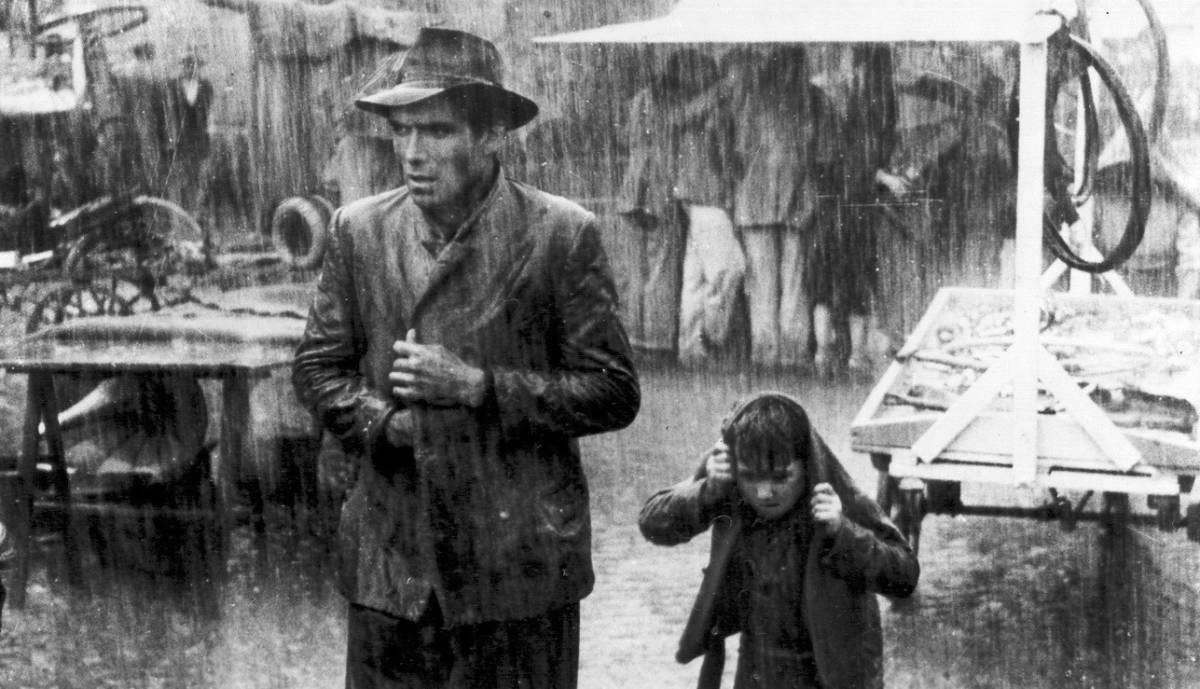Bicycle Thieves is another arthouse classic that immediately evokes certain impressions from people who haven’t seen the movie before. It has such a long-standing “FILM SCHOOL 101” stamp on its surface that it can be dismissed outright by those who don’t think this sort of film can be captivating, entertaining, or even useful.
Anyone who’s seen Bicycle Thieves, the Italian neorealist (gritty, grounded stories involving the working class) masterwork by Vittorio De Sica, already knows why the movie’s prominence hasn’t diminished.
I saw Bicycle Thieves because it’s one of those titles that shows up again and again when you talk about the history of Italian films, world cinema, or the aforementioned arthouse concept. That used to actually be a thing back when there were more than a few smaller movie theaters playing stuff beyond the blockbusters. I rented it from Netflix, so I missed that experience. The film still resonated with me, and still found things to show and tell me as I forgot about its place in history, and simply watched a brutally sad and powerfully dramatic, human movie.
The perfectly realized characters, with a focus on a father named Antonio (Lamberto Maggiorani, a non-actor who never regained the success he had here) and his young son Bruno (Enzo Staiola), are established as such within a few minutes. Then we follow Antonio and Bruno on their quest to pick up a bicycle that will determine whether Antonio will be able to get a job that will provide a lifeline to his starving family and their horrid post-World War II conditions. It goes badly, but I’ll let you watch Bicycle Thieves for yourself, and you can decide how their present suffering may inform their future.
There’s nothing flashy about Bicycle Thieves, from the execution of its bleak story and that story’s commitment to taking us through a full day in the life of just one family suffering through one of the darkest periods of Italy in the first half of the 20th century. The performances alone are unlike anything you’ve ever seen if this sort of movie is new to you.
There’s no pretension or elaborate manipulation with Bicycle Thieves. There’s a compelling narrative in which the very streets the movie was shot on only add to the growing frustration we feel watching Antonio and Bruno navigate one crisis after another. Then there’s your empathy. The striped-down core of neorealism can vary stylistically but will generally all look to achieve the same ends with the same set of tools. This is a sincere and powerful story of people we effortlessly believe and want to follow further. It’s not the easiest story to look at sometimes, but that’s nothing that should keep you from finally checking this out.
To put it another way, and this is how Bicycle Thieves worked for me: if you want to see more and different types of movies, Bicycle Thieves will check off the boxes in the most accessible way.
While we have you, cycle your way over to read the rest of MTSBYD.
READ NEXT: A Nightmare on Elm Street (1984) | Movies to See Before You Die
Some of the coverage you find on Cultured Vultures contains affiliate links, which provide us with small commissions based on purchases made from visiting our site.

![Bicycle Thieves (The Criterion Collection) [Blu-ray]](https://m.media-amazon.com/images/I/51Q5UKkTlTL._SL75_.jpg)
